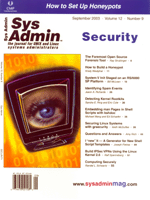
ChkrootkitChkrootkit is an outstanding tool to aid in the search for public Rootkits. It has more than 40 signatures of the most popular rootkits (application and kernel level) built in. Here is an example of using it to detect the installation of the Adore Kernel Rootkit:
Checking 'w'... not infected Checking 'write'... not infected Checking 'aliens'... no suspect files Searching for sniffer's logs, it may take a while... nothing found Searching for HiDrootkit's default dir... nothing found Searching for t0rn's default files and dirs... nothing found Searching for t0rn's v8 defaults... nothing found Searching for Lion Worm default files and dirs... nothing found Searching for RSHA's default files and dir... nothing found Searching for RH-Sharpe's default files... nothing found Searching for Ambient's rootkit (ark) default files and dirs... nothing found Searching for suspicious files and dirs, it may take a while... Searching for LPD Worm files and dirs... nothing found Searching for Ramen Worm files and dirs... nothing found Searching for Maniac files and dirs... nothing found Searching for RK17 files and dirs... nothing found Searching for Ducoci rootkit... nothing found Searching for Adore Worm... nothing found Searching for ShitC Worm... nothing found Searching for Omega Worm... nothing found Searching for Sadmind/IIS Worm... nothing found Searching for MonKit... nothing found Searching for Showtee... nothing found Searching for OpticKit... nothing found Searching for T.R.K... nothing found Searching for Mithra... nothing found Searching for LOC rootkit ... nothing found Searching for Romanian rootkit ... nothing found Searching for anomalies in shell history files... nothing found Checking 'asp'... not infected Checking 'bindshell'... not infected Checking 'lkm'... Warning: Adore LKM installed SIGINVISIBLE Adore found Warning: Possible LKM Trojan installedThe only problem with relying on signature-based utilities such as chkrootkit, is that they are designed to identify publicly released versions of rootkits. They may not detect new or modified versions of these rootkits. |